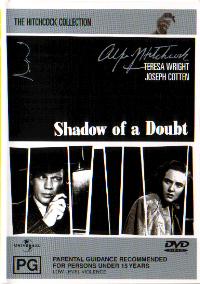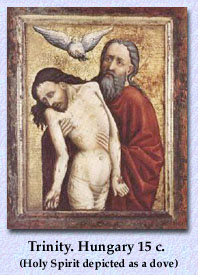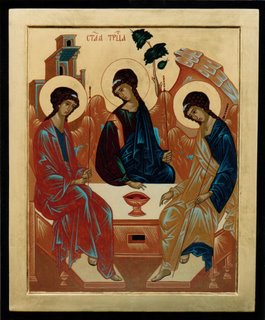Tuesday, November 28, 2006
Shadow of a Doubt
 Alfred Hitchcock said that of all of his own films, Shadow of a Doubt (1943) was his personal favourite. Its easy to see why. He takes a small American town in northern California and into it brings the darkness of "Uncle Charlie." Charlie (Joseph Cotton) is all smiles and charm on the surface but not far below that thin veneer he is a cynic, a confidence trickster and a hater of the human race. But is he a murderer? His niece and namesake Charlie (Teresa Wright) will have her naivete shattered as she learns more about her uncle than she ever wanted to know. In a rivetting scene at the family meal table Uncle Charlie's dark side comes out in Thornton Wilder's crisply written dialogue:
Alfred Hitchcock said that of all of his own films, Shadow of a Doubt (1943) was his personal favourite. Its easy to see why. He takes a small American town in northern California and into it brings the darkness of "Uncle Charlie." Charlie (Joseph Cotton) is all smiles and charm on the surface but not far below that thin veneer he is a cynic, a confidence trickster and a hater of the human race. But is he a murderer? His niece and namesake Charlie (Teresa Wright) will have her naivete shattered as she learns more about her uncle than she ever wanted to know. In a rivetting scene at the family meal table Uncle Charlie's dark side comes out in Thornton Wilder's crisply written dialogue:
"You think you know something, don't you? You think you're the clever little girl who knows something. There's so much you don't know, so much. What do you know, really? You're just an ordinary little girl, living in an ordinary little town. You wake up every morning of your life and you know perfectly well that there's nothing in the world to trouble you. You go through your ordinary little day, and at night you sleep your untroubled ordinary little sleep, filled with peaceful stupid dreams. And I brought you nightmares. Or did I? Or was it a silly, inexpert little lie? You live in a dream. You're a sleepwalker, blind. How do you know what the world is like? Do you know the world is a foul sty? Do you know, if you rip off the fronts of houses, you'd find swine? The world's a hell. What does it matter what happens in it? Wake up, Charlie. Use your wits. Learn something."
Here we see the nihilism that will lead a person to commit multiple murders because he has first depersonalised his victims and removed himself from the realm of moral accountability. In an other scene Uncle Charlie pontificates: "What's the use of looking backward? What's the use of looking ahead? Today's the thing - that's my philosophy. Today." The one who lives entirely in the now need not worry about judgement, retribution or accountability. A heinous act may be committed and then moved on from without guilt or qualm of conscience. The naive childlike innocence of the younger Charlie is slowly replaced by a harder realism. At the outset of the film the idea that such evil could exist in the world is unthinkable, and certainly could never come from her uncle whom she idolises. It's sad to see her lose that innocence but at the same time we know that she needs to do so if she is to develop an adult moral conscience.
The naive childlike innocence of the younger Charlie is slowly replaced by a harder realism. At the outset of the film the idea that such evil could exist in the world is unthinkable, and certainly could never come from her uncle whom she idolises. It's sad to see her lose that innocence but at the same time we know that she needs to do so if she is to develop an adult moral conscience.
There is an almost paedophilic relationship between the two as the older Charlie takes advantage of the adoration his niece shows him to ingratiate himself to her so that she will not unmask his dark past. As the younger Charlie realises his true identity the touch she once so dangerously coveted from him is something from which she now recoils. With courage she says no to his advances, unmasks his pretensions, and finds herself having to protect herself from becoming his next victim before, in a final showdown, he meets the fate we know he must meet if justice is to be served. This is a first rate thriller as only Hitch could make them. The innocence and charm of small town America has a shadow cast over it that will make you wonder what evil may lie in the heart of the seemingly innocuous. As with all the titles in Universal's Hitchock Collection, there is a great half-hour documentary on the DVD with many of the original cast of the film being interviewed as well as usual suspects such as daughter Pat Hitchock and Peter Bogdanovitch. Highly recomended. Four stars.
This is a first rate thriller as only Hitch could make them. The innocence and charm of small town America has a shadow cast over it that will make you wonder what evil may lie in the heart of the seemingly innocuous. As with all the titles in Universal's Hitchock Collection, there is a great half-hour documentary on the DVD with many of the original cast of the film being interviewed as well as usual suspects such as daughter Pat Hitchock and Peter Bogdanovitch. Highly recomended. Four stars.
Posted by
Glen O'Brien
at
4:09 pm
3
comments
![]()
Sunday, November 26, 2006
The Concert for Bangladesh
 On Sunday afternoon I sat down and watched the 1971 "Concert for Bangladesh" on DVD. Afterwards I wrote this review for the Bigpond movies site.
On Sunday afternoon I sat down and watched the 1971 "Concert for Bangladesh" on DVD. Afterwards I wrote this review for the Bigpond movies site.
This a wonderful slice of rock history with some really fine performances. The band is tight and George Harrison's gentle presence anchors the band as it stages a free concert to raise money for famine-stricken Bangladesh. And what a band! Ringo Starr AND Jim Keltner on drums, Eric Clapton on guitar, Leon Russell and Billy Preston on keyboards. Preston's performance of "That's the Way God Planned It" is an absolute revelation as his gospel roots take hold of him and he starts to shimmy and strutt across the stage like a pentecostal holy roller. It's great to hear Harrison perform Beatles tunes of his own composition such as "While My Guitar Gently Weeps," "Something," and "Here Comes the Sun" as well as his classic solo numbers such as "My Sweet Lord." Bob Dylan comes on at the end for a four-song set including "A Hard Rain's A Gonna Fall," "Blowin' in the Wind" and "Just Like a Woman." He's in fine form in his denim jacket and his 1971 "country Bob" vocal stylings. I even enjoyed Ravi Shankar's Indian music set (though admittedly I skipped it at first and then went back after I'd viewed the rest of the concert). If you're old enough to remember the cinema release of the concert this will be a nostalgia trip for you. If not, here's a chance to get educated on the first ever "Make Poverty History" style benefit concert.
Posted by
Glen O'Brien
at
5:27 pm
2
comments
![]()
Monday, November 20, 2006
Trinity and Mission (2)
 Not THAT Trinity! How'd that get uploaded to my Blogger dashboard?
Not THAT Trinity! How'd that get uploaded to my Blogger dashboard?
I received the following comment on The Trinity and Mission via email from Dr. Jon Case, Associate Professor of Theology at Houghton College, New York and thought I'd post it here.
"Think of the Trinity in doxological terms: Do you worship Jesus Christ? Do you worship God the Father? Do you worship, and pray to be filled with, the Holy Spirit?
If you answer yes to all of the above, then the question arises: just how many gods do you worship?
As a minimum, the doctrine of the Trinity attempts to maintain the tension that keeps you away from thinking of 3 gods and from thinking that Jesus, his Father and the Holy Spirit are not three distinct identities. If you say that they are not, then good luck to making sense of the NT. Father Son and Spirit interact with each other. Is that just a charade? If it is, then the text of the NT is no reliable guide to God.
Of course, if you answer 'no' to any of the above opening questions re Father, Son or Holy Spirit - you're in real trouble (and btw, you probably shouldn't be praying to be filled with a spirit that is not God's spirit).
If you answer: I just worship 'God' -and don't pay particular attention to the persons- then you have taken yourself right out of the pages of the NT. The earliest Christians worshipped Jesus --without denying worship to his Father-- by the infilling and power of the Holy Spirit. The worship came first - the theological precision followed a bit later.
If you say: 'Well of course I worship Father, Son and Holy Spirit and believe in only one God, but I don't want to use the term "Trinity" - let's use another term;' -- then in response I'd say you are showing poor theological judgement (a bit like trying to reinvent the wheel) and are needlessly causing confusion in the body of Christ.
So what difference does the doctrine of the Trinity make to mission? We are not calling people to merely follow Jesus (which by itself can be simply an ethical pursuit); we are calling them to worship Jesus. That activity, as the church has acknowledged, lands you in the middle of trinitarian considerations (in other words, just how many gods are we worshipping here?) And if you're not calling followers of Jesus to worship him, I'd say the whole idea of mission is in trouble."
The following was received by Dr. Mike Walters, Professor of Christian Ministries, at Houghton College:
"My daughter just had been asking me some questions about the Trinity for her cell group and I cobbled out a 3 page response...I'm very interested in the emergent church, for a number of reasons, but your response further down the page was appropriate. I once had a friend who left our mutual denomination (not the Wesleyans) who told me, "once the chicken leaves the egg, he/she then has to decide, "what will be my relationship to the shell? Will I disdain it as that which kept me bound, or will I gratefully acknowledge that it birthed me, protected and nurtured me, until I could walk on my own?"
Thanks for your comments guys.
Posted by
Glen O'Brien
at
12:34 pm
3
comments
![]()
Thursday, November 09, 2006
The Trinity and Mission
 This is a continuation of the very lengthy discussion in the comments section of my blog entry An Open Letter to My Friends in the Emerging Church. If you want to follow that interesting discussion, start there first and then continue on here.
This is a continuation of the very lengthy discussion in the comments section of my blog entry An Open Letter to My Friends in the Emerging Church. If you want to follow that interesting discussion, start there first and then continue on here.
The Trinity is not just (as Chris puts it in the earlier comments section) "a very useful concept to understand what God's trying to tell us." The Trinity is God. Of course the doctrine of the Trinity is a construct of language and of the mind, but so is all speech and all thought. Anything we say about God is metaphorical, not just what we say about the Trinity. Nobody claims, least of all the Trintarian theologians of the Nicene era, that the human mind can fully comprehend the being of God. All is mystery to us except what has been revealed. In Luther's language the only God we see is the God who is clothed in Jesus Christ. But what the appearance of Jesus Christ drives us to inevitably is a God who is Triune. What the church confesses about the Triune nature of God is not something spun out of the air by rampant Hellenism. It was religion before it was theology. All formal theology has as its precedent the actual experience of God in the Christian community and in the world. It's not something begun in the rarified atmosphere of abstract thought (though it sometimes may end up there). That Trinitarian language (like all language about God) is limited is simply a given in all theological discourse. As Augustine put it, "When the question is asked, What three? human language labours altogether under great poverty of speech. The answer, however, is given, three ‘persons,’ not that it might be (completely) spoken, but that it might not be left (wholly) unspoken.” So it is a straw man argument to say that the Trinity is something not very important because no one can completely wrap his or head around it. To follow this line of reasoning would be to confess nothing about God at all, since we cannot do so comprehensively.
Chris says that my "fascination with [theology] is more academic than practical. Does knowing the trinity exists make you do your mission work better?" My response to the first part of the sentence is, brother, you couldn't be more wrong about that. My answer to the question about the Trinity and mission is a resounding "Yes." On the first point - Theology is a discrete academic discipline in many universities and other institutes of higher learning, yes. And though I teach theology in one such place, and am involved in the academic discourse of the discipline, my primary commitment to theology is as a Christian for whom it matters to think seriously about God. Theology is the business of every Christian, not just academics and professional theologians. Michael Jinkins helpfully reminds us that theology is reflection upon all of life, not just upon “religious” matters, when he says "Theology is the essential business of faithful reflection on human life lived consciously in the presence of God." (Invitation to Theology, 17.) Nothing could be more practical than this.
Now to the question, "Does knowing the trinity exists make you do your mission work better?" Absolutely it does yes. The most significant (re)discovery of twentieth century theologians was that God's existence as a "Being-in-Communion" (and not simply a divine Monad) is the fundamental beginning point of all Christian thought and action. This rediscovery of the Trinity as the beginning point of all theology and practice, beginning with Karl Barth, was the single most influential insight in the development of theology in a post-modern (please note the hyphen) world. Chris, as one who hopes one day to be a professor of theology, familiarity with this direction in theology should be of crucial importance to you. No-one hated philosophical theology more than Barth (with the possible exception of Luther), but he didn't find the Trinity in the philosophers. He found the Triune God in the Bible and inescapably in the Person of Jesus Christ. It is because God is in Godself a Being-in-relation, and we are made in the image of the Triune God, that we are called to reflect that same image in all of our interaction with others. We are called to be open to God and to others in outgoing, self-forgetting, love. The trinitarian relations within the Godhead whereby the Father gives his Son for the life of the world, the Son gives glory to his Father through unstinting, though costly obedience, and the Holy Spirit is given to glorify, not himself, but both the Father and the Son, provide the model for our relationships to others. Believers, in their relationships with one another, and with the world, are caught up into the “ecstatic” fellowship of the Divine Family. The believer is called to be one who shares with the Father, the Son, and the Holy Spirit, in an “others-focused” orientation. Surely this is the only proper foundation for mission. Modern Trinitarian theology has helped us to see that the doctrine of the Trinity begins with a focus, not on God’s ontological being, but on God’s saving activity. It centres on Christ’s birth, life, death, resurrection, ascension, and the gift of the Holy Spirit. The doctrine of the Trinity, rather than being a doctrine derived from philosophical reflection on the nature of Absolute Being (a reflection which always tilts toward sheer monotheism or monarchianism), is rather the result of rational reflection on the saving activity of God in Christ. These divine occurrences confront human reason with the realization that only a triune God can account for them.
Modern Trinitarian theology has helped us to see that the doctrine of the Trinity begins with a focus, not on God’s ontological being, but on God’s saving activity. It centres on Christ’s birth, life, death, resurrection, ascension, and the gift of the Holy Spirit. The doctrine of the Trinity, rather than being a doctrine derived from philosophical reflection on the nature of Absolute Being (a reflection which always tilts toward sheer monotheism or monarchianism), is rather the result of rational reflection on the saving activity of God in Christ. These divine occurrences confront human reason with the realization that only a triune God can account for them.
Eric Macall wrote in Whatever Happened to the Human Mind (1980) : "The Trinity is not primarily a doctrine, any more than the Incarnation is primarily a doctrine. There is a doctrine about the Trinity, as there are doctrines about many other facts of existence, but if Christianity is true, the Trinity is not a doctrine, the Trinity is God. And the fact that God is Trinity - that in a profound and mysterious way, there are three divine Persons eternally united in one life of complete perfection and beatitude - is not a piece of gratuitous mystification, thrust by dictatorial clergymen, down the throats of an unwilling but helpless laity, and therefore to be accepted, if at all, with reluctance and discontent. It is the secret of God’s most intimate life and being, into which, in his infinite love and generosity, he has admitted us; and it is therefore to be accepted with amazed and exulted gratitude."
In the so-called postmodern world, it is more or less a given that individuals are not lone atoms but persons in relation. There is no longer any "autonomous man" (now a thankfully debunked modernist myth). Each person is who that person is because of intimate connections with other persons. The doctrine of the Trinity speaks profoundly to this realization, for it tells us that God’s own being is constituted in precisely this way - God is a being in communion. This communion is, moreover, a loving communion. As Robert Wilkin has it, “The doctrine of the Trinity reaches to the deepest recesses of the soul and helps us know the majesty of God’s presence and the mystery of his love. Love is the most authentic mark of the Christian life, and love among humans, as within God, requires community with others and a sharing of the deepest kind.”
After all, to which God are we introducing people when we engage in mission? Not Plato's Unmoved Mover, or the Absolute Monad of Arianism or of Universalism, but the God whose Name is Father, Son, and Holy Spirit. This is not some vague Higher Power or Supreme Being, but a Particular God - a God with a history. This is the God whose Name we all received at our Baptism, the God of Abraham, Isaac and Jacob (yes, and of Athanasius too), who brought our ancestors through the Red Sea, who transformed the world through the cross and the empty tomb. Chris says we can learn a lot from Buddhists and Mormons, and of course we need to be respectful listeners to all people. We cannot say we disagree until we can first say we understand and the church has not always been good at this. But what will happen if we lose the distinctiveness of the God we confess, what if we forget God's Name, what if we forget our Story, what will we have to offer in the dialogue? If emergent/missional churches are going to sit loose on the Trinity I truly fear for them.
Finally (if you've got this far you're probably one of the few), Chris thinks I'm mistaken when I say my church is "traditional" and that in fact we are "missional" but don't know it. I think we are using the word "traditional" in completely different senses (which is a very bad basis for dialogue). Chris, you seem to use it to mean something like this (correct me if I'm wrong) - "evangelical churches who are unfaithful to the Gospel because they are so consumed by running their own programmes that they are not engaged in mission beyond their own four walls." You see, to me there is nothing traditional about that at all. Some churches (of all kinds) are stuck in this pattern and some churches are not. I would suggest that far fewer are as dead in this respect as the emergent/missional churches claim. How then might I define my church as "traditional" and thus different from a typical emergent approach?
We believe that God calls us to gather together on the first day of each week in commemoration of the resurrection of Jesus Christ from the dead. It's not a sabbath - it's the Lord's Day - a mini-Easter every Sunday (or if you like every Easter is a Big Sunday). Emergent/missional churches don't think it's all that important on which day they meet or indeed if they meet weekly at all. Any day or time of the week will do; it's all the same to the Lord.
When we gather we enact a liturgy that narrates the story of what God has done in Christ. We enjoy preaching and we like it to be from the pulpit, a symbol, not of the minister's authority, but of the authority of Holy Scripture. We take up an offering each week because we think Christians should discipline their love of money and because we want to support and enable the church, including the pastor, in its ministry. We don't think it's absolutely necessary to sing hymns or any other kind of songs, but we embrace music (especially hymnody) gratefully and enthusiastically. Emergent/missional churches don't typically think too much of these patterns of worship, though some will do them. But worship is just as valid if it's meeting with a Christian friend down at the local cafe and having a talk about Jesus. We love to meet our friends at the cafe too but we wouldn't feel, like we had worshipped or "been to church." That's one of the things that makes us "traditional."
Like emergent/missional churches we wholeheartedly believe that ministry belongs to the whole people of God and that the church should do its utmost to equip and enable all of its members to fulfil their task in ministry. However, we still believe God calls men and women to a Ministry of Word, Sacrament, and Order - to have a shepherding responsibility over a Christian congregation. It would certainly be wrong for our pastors to big note themselves or lord it over their flocks, but we want to honour them and respect them as the Scriptures command us. We believe that a ministry of preaching, teaching, and pastoral care requires a high level of professional skill and knowledge development, so we want our ministerial candidates to have a degree in theology as well as whatever other specialised training helps them in their ministry. Just as we want the members of our congregation who are doctors, plumbers, or garbage collectors to give themsleves wholeheartedly to their life's vocation, to be recompensed fairly for their labours and to have safe and just workplace conditions, so we want our pastors to have the same. In keeping with this, a large proportion of our budget goes to pastoral support and we are unapologetic about this. This makes us "traditional." Emergent/missional churches tend to frown on professional clergy as a waste of money and resources and feel (again correct me if I'm wrong) that the system obscures the priesthood and ministry of all believers, so that the pastor does all the work and nobody else does anything. It's okay to operate without paid pastors of course, but it cannot be the only way. We (and millions like us) are happy with the traditional model of pastoral supply and apparently still reasonably "missional" as well.
To me "traditional" just means doing things pretty much the way the church has always done it, and "emergent" means trying something different. By that definition our congregation is "traditional" and emergent churches are not. One can be just as effective in mission as another.
Posted by
Glen O'Brien
at
2:17 pm
5
comments
![]()
Wednesday, November 01, 2006
An Open Letter to My Friends in the Emerging Church
 Recently I attended a seminar during which an emergent church leader reassured his audience that the movement supported more traditional types of churches and was not making the claim that the emergent model was the only way to go but simply one of many possible configurations. "We are here to help. We believe in what you are doing. We want to affirm you and also share with you the insights of our particular model." Well that sounded pretty good to me. Later that week I went to the website of the ministry he represented and the first image I saw was of a traditional suburban church with a large "Detour" sign pointing away from it! What's going on here guys? Excuse the politically incorrect language but does the emergent church speak with forked tongue? Are you guys in solidarity with the whole of the church or not?
Recently I attended a seminar during which an emergent church leader reassured his audience that the movement supported more traditional types of churches and was not making the claim that the emergent model was the only way to go but simply one of many possible configurations. "We are here to help. We believe in what you are doing. We want to affirm you and also share with you the insights of our particular model." Well that sounded pretty good to me. Later that week I went to the website of the ministry he represented and the first image I saw was of a traditional suburban church with a large "Detour" sign pointing away from it! What's going on here guys? Excuse the politically incorrect language but does the emergent church speak with forked tongue? Are you guys in solidarity with the whole of the church or not?
Off I went to another emergent church website, one belonging to the same denomination as my own, and found the image you see here, captioned "The Missional Church, turning the established church on its steeple..." Can I just say as the pastor of a more or less traditional church that I am a little offended by such images and by the anti-traditional-church rhetoric that seems to be a part of the emergent church's mandatory discourse. I think some of the emergent churches are doing great things, especially those who are identifying with the poor and the marginalised, in ways that would make some evangelical churches bow their heads in shame. I applaud the recovery of sacramental life that is evident in some quarters. Who could object to an emphasis on a missional presence in communities hitherto unreached by the church? Certainly not me. My general impression of the traditional evangelical church's response to the emergent church movement has been "Go for it; If you can reach people we can't, more power to ya. In fact. we'll give you money and personnel and prayer support and other resources to help make it happen." (At least this has been the case in my own denomination.) But what do the more traditional churches get in reply - we are mocked, ridiculed, and made the butt of jokes. We are told that we are hopelessly behind the times, that our methods are ineffective, that we aren't missional, that we don't care about reaching unreached people, that the wave of the future is with the emergent church and unless we get on board, we'll miss what God is doing.
This is particularly galling when you reflect on the fact that the leadership of the emergent church is made up of people birthed in, nurtured in, trained by, and supported by the traditional church you seem called to bag out. Please brothers and sisters I urge you not to bite the hand that feeds. We are your own family. We prayed for you, loved you, wept with you, rejoiced with you, and encouraged you to give your all in service to Christ and the Gospel. Now that you are doing that (albeit in a little different way than some might have expected) it hurts to be told we are redundant.
It is also hurtful (and myopic) to assume that the traditional church is not missional because it meets in a chapel and not in a pub or in a cafe and it sings hymns and preaches sermons and passes the plate in the good ol' fashioned way. My congregation averages about 25 people from all walks of life. Typically between Sundays, members do such things as volunteer in a cafe that ministers to street people, counsel marginalised youth, provide marriage counselling, volunteer construction help in a primary school in an impoverished area, talk to their neighbours about Jesus and the list goes on. Do people in the emergent church think they are the only ones who undertand this principle of incarnational presence in the world? Or that any of this is in any way new? What is "emergent" about this kind of living? (Does any body remember the Jesus movement. Maybe not; it was after all 30 years ago). Extending and completing the church's gathered worship by going out and serving the wider world is as old as the church itself and church history provides any number of examples of people who modelled this in magnificent ways, whether Francis of Assisi, William Booth, or St. Columba of Scotland! Little suburban churches all over the country live like this, but they are not interested in dispensing with their regular gathering on the first day of the week. They gather around Word and Sacrament each Sunday. They sit in pews. They drink coffee and chat over morning tea. It isn't hip, it isn't sexy. There's nothing emergent about it. But it's church and it's been going on for two millennia and it will continue to go on until Jesus comes again. The discipleship of these people is just as real and just as genuine, and in some cases more so, than some more hip emergents for whom these grey headed little old ladies and gents are the target of ridicule.
I have no problem with the church "scattering" into its community for mission. But I do have a problem when this scattering is set over against the church's "gathering." The church is, or should be both "scattered" and "gathered." I do not believe that sitting with a mate down at Starbucks and talking about Jesus can be called "having church." It's a great thing to do, and I wish I could do it more often, but it isn't church and it isn't the church's liturgy. The church's gathering is something concrete and identifiable. We are welcomed into a specific community through our baptism. We, the baptised, gather to narrate the story of God's saving work in Jesus Christ. We gather to be guided and taught by Holy Scripture, to hear the stories from our family album (I almost said "family history" but "history" might sound too traditional.) We gather to make Eucharist (give thanks), to break bread together in remembrance of Christ. These things have a concrete, local, specific and particular manifestation in real space and time. There is a circumference to our circle. We are those called by and named by Christ. Mission means the circle is always enlarging (or should be) but the church is not some amorphous (shapeless) thing with no boundary or identifiable limit. It is incarnate (embodied) not gnostic (reified). Our weekly liturgy, held to commemmorate the day upon which God raised Christ from the dead, is a celebration of God's saving work in Christ participated in by those who by the Spirit have been made his people. Admittedly it's not always done well or faithfully and perhaps this is why many of you in the emergent church have left more traditional churches. But it has been going on since the first Pentecost and I don't see it being replaced any time soon.
Look, pardon my passion in all this but I guess what I want to say here is that we are brothers and sisters together in the one church. We may differ from each other in certain ways and in this post I have been critical of certain blind spots I believe the emergent church has. But I believe in your right to exist. I applaud your efforts to emulate Jesus and reach people with the good news of God's love. I celebrate the grace of God at work in your faith communities. All I ask is that you return the sentiment.
Posted by
Glen O'Brien
at
3:55 pm
21
comments
![]()
Labels: Theology
Kingsley chapel message: Romans 15:23-33
 I’m not sure what you think of when you hear of Spain. Maybe you think of bullfighting, flamenco dancing, or conquistadors. A lot of people think of clubbing because Spain is one of, if not, the biggest nightclub country in Europe. But when the Apostle Paul thought of Spain he thought of only one thing – the thousands there who had not heard of Christ. To get as far as Spain and to preach the Gospel was the goal and destination of his missionary endeavour. His destiny instead was imprisonment, chains, and death in Rome. (The image in this post is Rembrandt's Paul in Prison)
I’m not sure what you think of when you hear of Spain. Maybe you think of bullfighting, flamenco dancing, or conquistadors. A lot of people think of clubbing because Spain is one of, if not, the biggest nightclub country in Europe. But when the Apostle Paul thought of Spain he thought of only one thing – the thousands there who had not heard of Christ. To get as far as Spain and to preach the Gospel was the goal and destination of his missionary endeavour. His destiny instead was imprisonment, chains, and death in Rome. (The image in this post is Rembrandt's Paul in Prison)
He had already stated in verse 20-22 that he wanted to preach Christ where he was not already proclaimed (vv.20-22). In order to do this he planned to visit the church in Rome en route to Spain (vv.23-24). But first he had a detour to negotiate as is clear in verses 25-29. He was on his way to Jerusalem in the service of the Lord’s people there. The Macedonians and Achaians had made a contribution to the famine-struck Jewish believers and Paul wanted to deliver this aid, before he went on to pursue his Spanish vocation. Paul seems to have been a person who was open to God’s purposes in any detours that he might meet with along the way.
You may have seen the ad on TV where a group of twenty-somethings jump onto a train somewhere in Europe and they are all excited about getting to Paris or somewhere and the conductor calls out “All aboard the express train leaving for Berlin”! They all look at each other with shocked expressions as if to say, “Berlin! We’re on the wrong train!” But then just as quickly they dissolve into laughter and excitement again, “Oh well, Berlin it is then; It’ll probably be just as much fun!”
If only we could deal with the disappointments and detours of life so well. I don’t know about you but when I have a goal in life that I don’t reach I feel like a failure. I have had a number of pretty major disappointments in life and ministry and I am sure you have also. But would you say Paul was a failure because he didn’t ever get to Spain? I don’t think so. God had other plans for him, plans which were not known to him at the time that he wrote to the Roman believers. By the time he wrote to Timothy in 1 Timothy 4:6-7 he had greater clarity on his destiny. Assuming Paul wrote the Pastoral Epistles (I’m sure you won’t mind me assuming that) they were probably written between the end of his first Roman imprisonment and his likely execution under Nero (A.D. 63-67). By this time he was able to write, “For I am already being poured out like a drink offering, and the time for my departure is near. I have fought the good fight; I have finished the race; I have kept the faith.” In Romans he is coming to Rome via Jerusalem and en route to Spain. In 1 Timothy he has come to Rome to die and he never will see Spain. The missionary trip to Spain was a straightforward plan, all laid out and fully in keeping with Paul’s vocation as a missionary. But it was not to play out the way he expected.
What is your Spain? What has God called you to do? Keep heading toward it. But be aware that God may have something else in mind. Paul never did get to Spain, but he sure went a long way in the attempt and he sure did a lot of good along the way. So we haven’t met our life goals yet. So we are not today where we thought we would be five, ten, or twenty years ago. So what? This will only feel like a failure to us if we are self-made, self-directed, career-focused success mongers. But we are not that; we are servants of God and of Christ. We go where God disposes and we do as much good as we can wherever we find ourselves. Have we failed because we felt God called us to a certain thing and we never did get there? I’m not talking about those who are in disobedience because they don’t follow God’s call. But there are those who wholeheartedly set the course of their life in one direction and end up somewhere else. This is not failure at all. It’s simply reassignment.
I was recently reading of a man who left the Catholic priesthood and felt shame and guilt because he had left his vows. While he was still a Jesuit, because he had taken a vow of poverty, he could not give or receive personal gifts, even at Christmas. His niece said to him, “Uncle I bought you a present this year but I can’t give it to you because Mummy said you aren’t allowed to own anything.” “That’s right darling,” he answered. “And that’s because you’re a priest isn’t it?” “Yes sweetheart that’s right.” “Well, that’s OK,” she assured him, “I’ll just keep it and give it to you when you’re a man again.”
To come to the realization that one is allowed to be “just a man” without other identifying or legitimizing features is a liberating thing and if it is God’s appointment that we move from one thing in life to another there need be no sense of shame or failure involved. If your Spain becomes your Rome just remember your God is still your God, you are still his child, and your life remains where it has always been – in his hands.
Posted by
Glen O'Brien
at
11:49 am
5
comments
![]()

